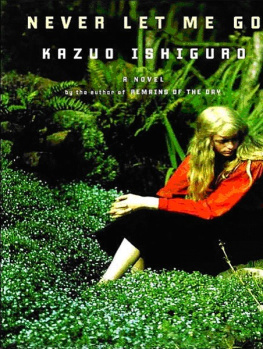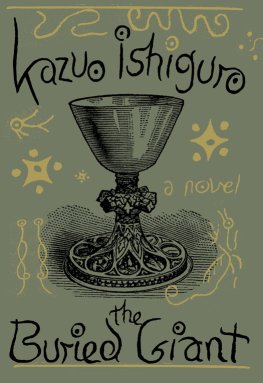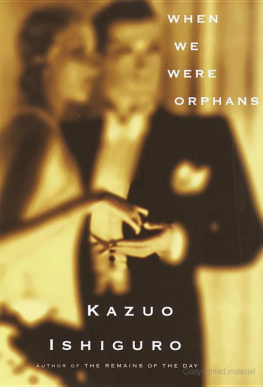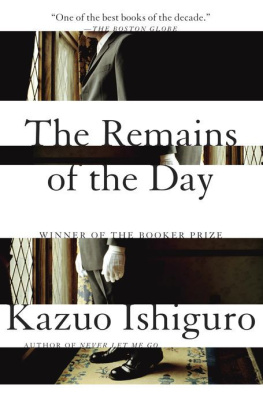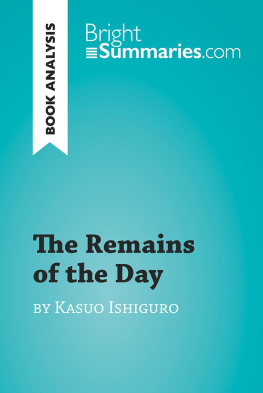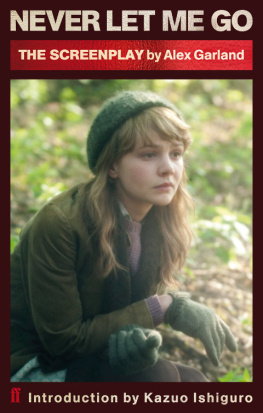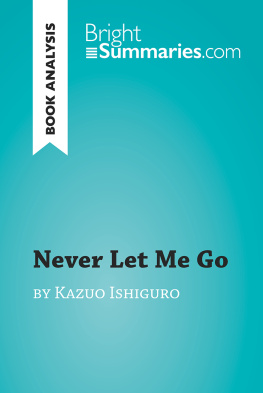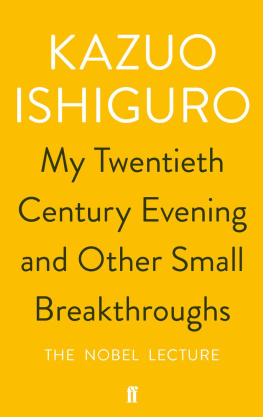Kazuo Ishiguro - An Artist of the Floating World
Here you can read online Kazuo Ishiguro - An Artist of the Floating World full text of the book (entire story) in english for free. Download pdf and epub, get meaning, cover and reviews about this ebook. year: 2012, publisher: Vintage, genre: Detective and thriller. Description of the work, (preface) as well as reviews are available. Best literature library LitArk.com created for fans of good reading and offers a wide selection of genres:
Romance novel
Science fiction
Adventure
Detective
Science
History
Home and family
Prose
Art
Politics
Computer
Non-fiction
Religion
Business
Children
Humor
Choose a favorite category and find really read worthwhile books. Enjoy immersion in the world of imagination, feel the emotions of the characters or learn something new for yourself, make an fascinating discovery.

- Book:An Artist of the Floating World
- Author:
- Publisher:Vintage
- Genre:
- Year:2012
- Rating:4 / 5
- Favourites:Add to favourites
- Your mark:
- 80
- 1
- 2
- 3
- 4
- 5
An Artist of the Floating World: summary, description and annotation
We offer to read an annotation, description, summary or preface (depends on what the author of the book "An Artist of the Floating World" wrote himself). If you haven't found the necessary information about the book — write in the comments, we will try to find it.
An Artist of the Floating World — read online for free the complete book (whole text) full work
Below is the text of the book, divided by pages. System saving the place of the last page read, allows you to conveniently read the book "An Artist of the Floating World" online for free, without having to search again every time where you left off. Put a bookmark, and you can go to the page where you finished reading at any time.
Font size:
Interval:
Bookmark:

Books by Kazuo Ishiguro
NOCTURNES
NEVER LET ME GO
WHEN WE WERE ORPHANS
THE UNCONSOLED
THE REMAINS OF THE DAY
AN ARTIST OF THE FLOATING WORLD
A PALE VIEW OF HILLS


F IRST V INTAGE I NTERNATIONAL E DITION ,
SEPTEMBER 1989
Copyright 1986 by Kazuo Ishiguro
All rights reserved under International and Pan-American Copyright Conventions. Published in the United States by Vintage Books, a division of Random House, Inc., New York. Originally published, in hardcover, by G.P. Putnams Sons, New York, in 1986.
Library of Congress
Cataloging-in-Publication Data
Ishiguro, Kazuo, 1954
An artist of the floating world/Kazuo Ishiguro.1st Vintage international ed.
p. cm.(Vintage international)
eISBN: 978-0-307-82906-1: $8.95
I. Title.
[PR6059.S5A89 1989]
823.914dc20 89-40288
v3.1
For my parents
1948
If on a sunny day you climb the steep path leading up from the little wooden bridge still referred to around here as the Bridge of Hesitation, you will not have to walk far before the roof of my house becomes visible between the tops of two gingko trees. Even if it did not occupy such a commanding position on the hill, the house would still stand out from all others nearby, so that as you come up the path, you may find yourself wondering what sort of wealthy man owns it.
But then I am not, nor have I ever been, a wealthy man. The imposing air of the house will be accounted for, perhaps, if I inform you that it was built by my predecessor, and that he was none other than Akira Sugimura. Of course, you may be new to this city, in which case the name of Akira Sugimura may not be familiar to you. But mention it to anyone who lived here before the war and you will learn that for thirty years or so, Sugimura was unquestionably amongst the citys most respected and influential men.
If I tell you this, and when arriving at the top of the hill you stand and look at the fine cedar gateway, the large area bound by the garden wall, the roof with its elegant tiles and its stylishly carved ridgepole pointing out over the view, you may well wonder how I came to acquire such a property, being as I claim a man of only moderate means. The truth is, I bought the house for a nominal sum a figure probably not even half the propertys true value at that time. This was made possible owing to a most curious some may say foolish procedure instigated by the Sugimura family during the sale.
It is now already a thing of some fifteen years ago. In those days, when my circumstances seemed to improve with each month, my wife had begun to press me to find a new house. With her usual foresight, she had argued the importance of our having a house in keeping with our status not out of vanity, but for the sake of our childrens marriage prospects. I saw the sense in this, but since Setsuko, our eldest, was still only fourteen or fifteen, I did not go about the matter with any urgency. Nevertheless, for a year or so, whenever I heard of a suitable house for sale, I would remember to make enquiries. It was one of my pupils who first brought it to my attention that Akira Sugimuras house, a year after his death, was to be sold off. That I should buy such a house seemed absurd, and I put the suggestion down to the exaggerated respect my pupils always had for me. But I made enquiries all the same, and gained an unexpected response.
I received a visit one afternoon from two haughty, grey-haired ladies, who turned out to be the daughters of Akira Sugimura. When I expressed my surprise at receiving such personal attention from a family of such distinction, the elder of the sisters told me coldly that they had not come simply out of courtesy. Over the previous months, a fair number of enquiries had been received for their late fathers house, but the family had in the end decided to refuse all but four of the applications. These four applicants had been selected carefully by family members on grounds purely of good character and achievement.
It is of the first importance to us, she went on, that the house our father built should pass to one he would have approved of and deemed worthy of it. Of course, circumstances oblige us to consider the financial aspect, but this is strictly secondary. We have therefore set a price.
At this point, the younger sister, who had barely spoken, presented me with an envelope, and they watched me sternly as I opened it. Inside was a single sheet of paper, blank but for a figure written elegantly with an ink brush. I was about to express my astonishment at the low price, but then saw from the faces before me that further discussion of finances would be considered distasteful. The elder sister said simply: It will not be in the interests of any of you to try to outbid one another. We are not interested in receiving anything beyond the quoted price. What we mean to do from here on is to conduct an auction of prestige.
They had come in person, she explained, to ask formally on behalf of the Sugimura family that I submit myself along, of course, with the other three applicants to a closer investigation of my background and credentials. A suitable buyer could thus be chosen.
It was an eccentric procedure, but I saw nothing objectionable about it; it was, after all, much the same as being involved in a marriage negotiation. Indeed, I felt somewhat flattered to be considered by this old and hidebound family as a worthy candidate. When I gave my consent to the investigation, and expressed my gratitude to them, the younger sister addressed me for the first time, saying: Our father was a cultured man, Mr Ono. He had much respect for artists. Indeed, he knew of your work.
In the days which followed, I made enquiries of my own, and discovered the truth of the younger sisters words; Akira Sugimura had indeed been something of an art enthusiast who on numerous occasions had supported exhibitions with his money. I also came across certain interesting rumours: a significant section of the Sugimura family, it seemed, had been against selling the house at all, and there had been some bitter arguments. In the end, financial pressures meant a sale was inevitable, and the odd procedures around the transaction represented the compromise reached with those who had not wished the house to pass out of the family. That there was something high-handed about these arrangements there was no denying; but for my part, I was prepared to sympathize with the sentiments of a family with such a distinguished history. My wife, however, did not take kindly to the idea of an investigation.
Who do they think they are? she protested. We should tell them we want nothing further to do with them.
But wheres the harm? I pointed out. We have nothing we wouldnt want them to discover. True, I dont have a wealthy background, but no doubt the Sugimuras know that already, and they still think us worthy candidates. Let them investigate, they can only find things that will be to our advantage. And I made a point of adding: In any case, theyre doing no more than they would if we were negotiating a marriage with them. Well have to get used to this sort of thing.
Besides, there was surely much to admire in the idea of an auction of prestige, as the elder daughter called it. One wonders why things are not settled more often by such means. How so much more honourable is such a contest, in which ones moral conduct and achievement are brought as witnesses rather than the size of ones purse. I can still recall the deep satisfaction I felt when I learnt the Sugimuras after the most thorough investigation had deemed me the most worthy of the house they so prized. And certainly, the house is one worth having suffered a few inconveniences for; despite its impressive and imposing exterior, it is inside a place of soft, natural woods selected for the beauty of their grains, and all of us who lived in it came to find it most conducive to relaxation and calm.
Next pageFont size:
Interval:
Bookmark:
Similar books «An Artist of the Floating World»
Look at similar books to An Artist of the Floating World. We have selected literature similar in name and meaning in the hope of providing readers with more options to find new, interesting, not yet read works.
Discussion, reviews of the book An Artist of the Floating World and just readers' own opinions. Leave your comments, write what you think about the work, its meaning or the main characters. Specify what exactly you liked and what you didn't like, and why you think so.

